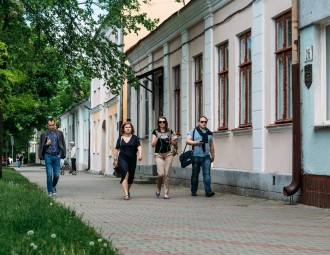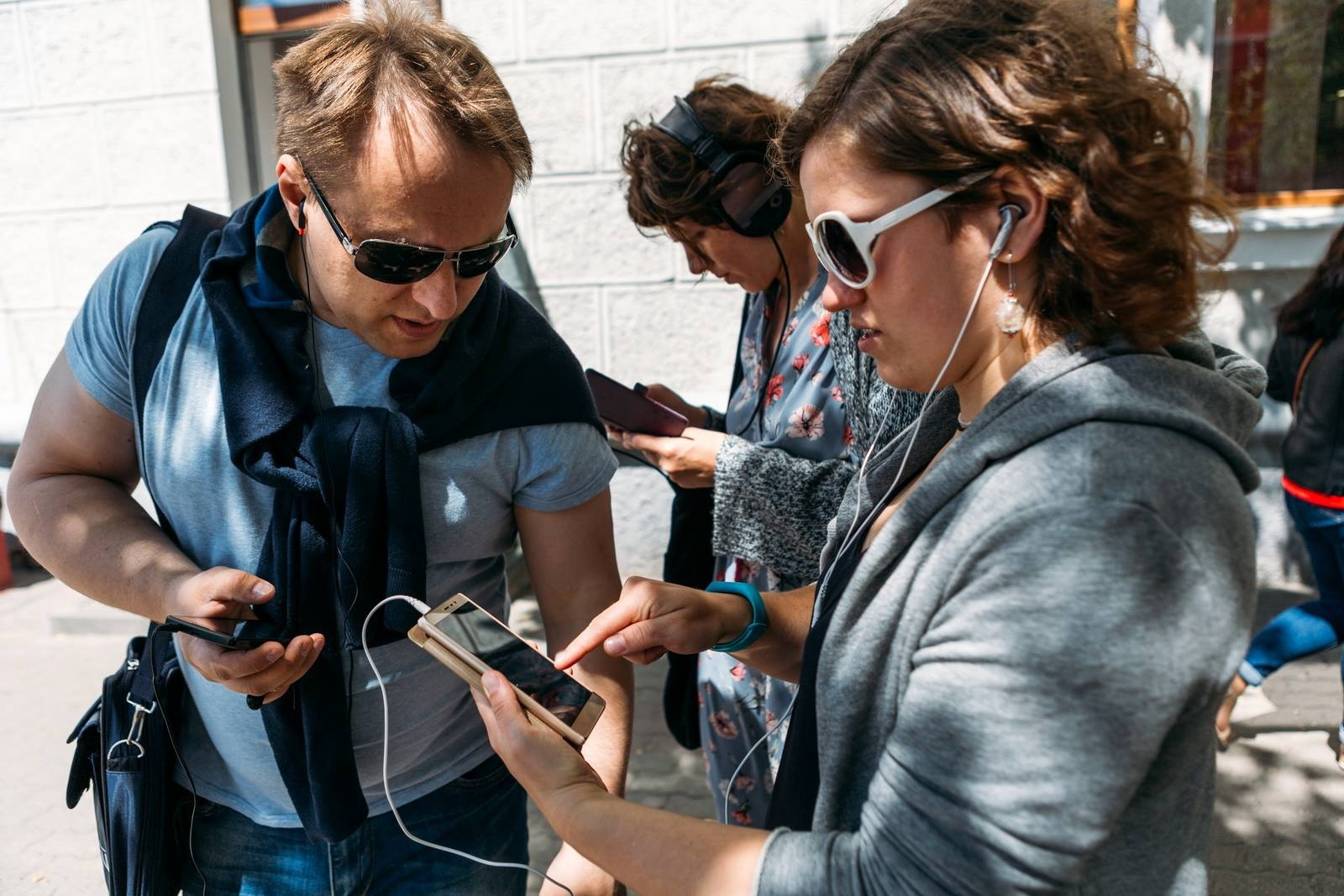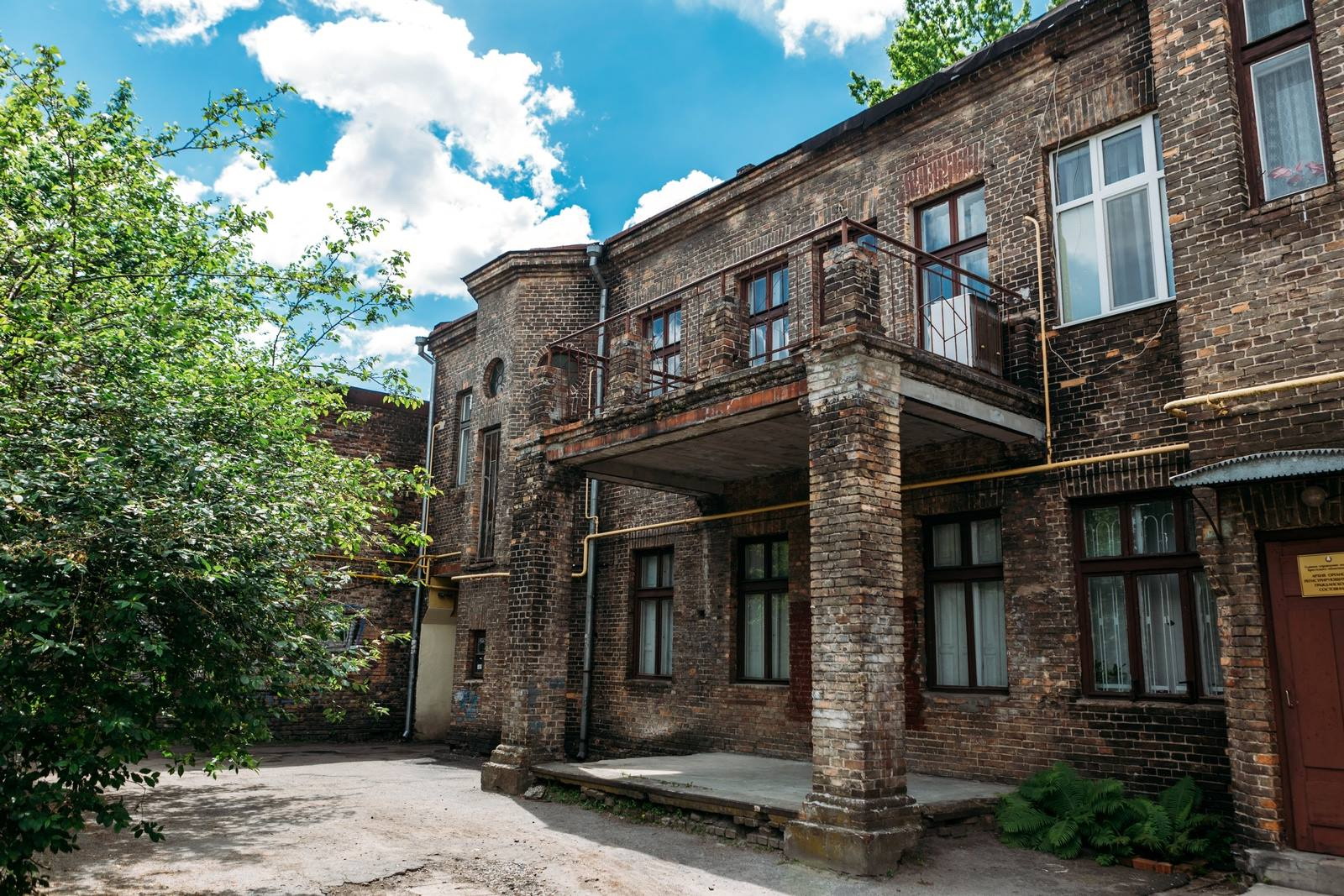Oksana Gaiko - Our audio guide of Brest is a monument to Holocaust victims
 Фото: Роман Чмель
Фото: Роман Чмель
The center of Brest can now be studied with the help of an audio guide called Brest Stories Guide - however, meanwhile, only one of the city pages - anti-Semitism and the Holocaust.
For several hours, one plunges into the 1930s-194s and lives them together with the characters of the audio performance. We have asked Oksana Gaiko, head of the Brest-placed independent theater “KrylyChalopa” and one of the authors of the guide, of the topicality of such innovative products and of the immersing in the little-known layers of city heritage.
- Oksana, I have taken part in such an excursion for the first time. The feelings differ from those when one travels around the city in an excursion bus. Walking the streets, one becomes a part of the history of Brest. Is this the effect you tried to achieve with the help of such an audio performance?
- Such an effect is difficult to plan. First of all, this project is aimed at deepening people’s knowledge of the history of Brest. The documentary audio performance about the Holocaust is not based on the play. It includes stories of real people and documents; there is no fiction here. We place the listener in the space of old Brest – fortunately, there is something left of it. The city streets and yards are like alive sceneries. Therefore, all the stories are perceived properly and taken to heart.

The history of the Brest Jews is similar to a trauma the city has preferred to forget. It is clear that we try to forget traumas. But no matter how unpleasant it is, it is necessary to remember such events. We want our spectators to realize all horror of anti-Semitism and system destruction of people after our performance and the walk around Brest. Also, we want to personify the memory of anonymous victims.
Spectators, participants not only listen to the stories, but they also see a route in their phones – where they walk in the concrete moment. Objects of Jewish heritage, as well as the key places that have to do with the ghetto and destruction of people, are on the map. The spectator can read about these objects and see photos. We believe that such a city history will be interesting not only to inhabitants of Brest, but also tourists.
- Tell us more about the creation of Brest Stories Guide.
- Brest Stories Guide is not only an app, but also a web-site where it is possible to receive the general information on the project. The performance is innovative; this is an app to be tested; therefore, we are testing it now. The end-product will also be influenced, by the way, by remarks of the first listeners.
We took texts for records from many sources - their list is on the web-site. Besides eyewitnesses’ stories - inhabitants of Brest, the survived Jews, - data from German documents were included in the performance. These are stories of German officers, soldiers, and doctors who served in Brest in 1941-1942 – they testified during trials in the 1960s connected with the Holocaust.
It was important for us to say that the topic of intolerance to Others is topical today. There is still everyday anti-Semitism around us. Today, in Europe, we observe the crisis of refugees, the growth of the right moods. Therefore, it is important to speak about the Holocaust, especially in Belarus, where it is still a half-closed topic.
The best actors of Brest theaters were involved to voice the performance. They were selected very carefully because the spectrum of actors is strongly limited in audio performances, and we needed the best voices, timbres, and dictions only. Therefore, for example, we have three Honored Artists of Belarus.
As for monetization, the Brest Stories Guide can be downloaded free of charge. The basic help in its creation was rendered by the international project CHOICE - Cultural Heritage: Opportunity for Improving Civic Engagement. Now, we are in the process of organizing donations - donations of all interested people to the further life of the project.
- What inspired you to make such a project?
- Basically, experiments with new technologies and the new theatrical language of some European theaters. For example, I like very much the performance of the German theater «Rimini the Report» made on the basis of the Stasi archives. The spectator walks the streets of Berlin and in certain places through a radio wave receives from the ear phones a record of conversations recorded by the Stasi in the concrete house.
Our challenge was the fact that Brest has many absolutely different histories, but the identity of the city is built exclusively around the defending of the Brest Fortress in 1941 and heroism of Soviet soldiers. (Still, such victims as Jews or prisoners of war are forgotten at all). Local tourism is built on it - the most popular fetes in the city are May, 9th, and June, 22nd.
The city has a very "man's" face – the heroes the city’s identity is based on are exclusively men-soldiers. Therefore, for example, we plan to make a route connected with the female history of Brest. Also, we are interested in the 1990s, the change of formations, the life of suburbs, queues and rallies on the Square… I want very much the Jewish path in the city to be the first, but not the only one.
- Why have you chosen such a general name, instead of, say, «Historical Brest»?
- We had different variants and it took us a long time to pick a name. We decided to make it English because new technologies were involved, and we have plans to make an English version for tourists. We wanted to make the name understandable as much as possible to each person, even a child. It turned into the three words, which, in our opinion, reflect maximally the project’s contents - Brest Stories Guide - a guide to Brest stories. After all, the project is built on stories of real people who lived or live in Brest.

- One of the entries to the former ghetto on Gogol Street is in the form of drop-forged gates. People walk through them and happen to be in a pleasant atmosphere of a boulevard, they have a rest here. Is it necessary to put a tablet near the gates, saying that it used to be the entry to the ghetto?
- It would be quite good. Also, I would draw a dotted line on asphalt to mark the ghetto border. At least, in some places. So that people would cross it and think for a second of the city’s history. Brest does have a monument to Holocaust victims, but, it seems to me, it is not informative enough.
- Can such audio performances replace architectural reconstructions?
- It is an absolutely different approach. Reconstruction is expensive and not always clear what for? We virtually give a chance to touch heritage, to use imagination, and - behind today’s facades - to "see" historical events, to feel what is hidden by yards that saw horror. In some way, the guide is a protection tool as well. A virtual monument to the destroyed 24,000 Jews of Brest.
It seems to me the project is strong as it is between disciplines. Besides the work with heritage, we develop the Belarusan theater, we give it a contemporary language, and we make it more modern and topical. Besides, we create a new tourist product, a new tool of studying the city, where not tour operators, not authors of guidebooks, but its inhabitants tell you about Brest.
The International Project "CHOICE - Cultural Heritage: Opportunity for Improving Civic Engagement" is implemented by the Association of Local Democracy Agencies ALDA (France) in conjunction with the International Consortium EuroBelarus (Lithuania).

-
03.01
-
07.10
-
22.09
-
17.08
-
12.08
-
30.09



























